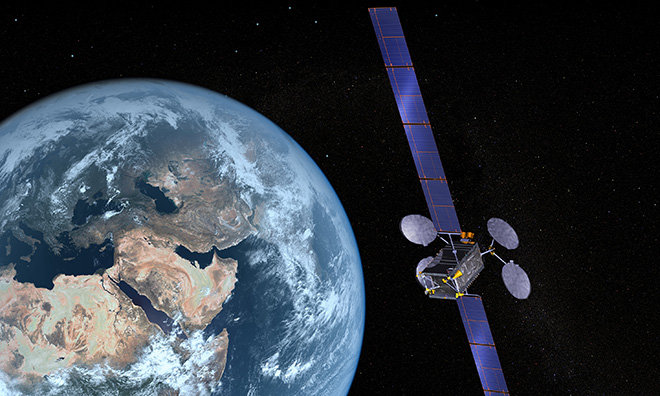Apple among big tech companies reportedly in talks to buy Boeing communications satellite
Last updated
Boeing is marketing advanced high-throughput communications satellites to large technology firms, such as Apple and Google, and could reach a deal to build a unit for a major industry player this year.
At the four-day Satellite 2015 conference, which kicked off on Monday, Boeing revealed to Reuters that tech firms like Apple, Google, Amazon and Facebook are looking to enlarge the Internet's global footprint through the use of high-bandwidth satellites.
"The real key to being able to do these type of things is ultra high-throughput capabilities, where we're looking at providing gigabytes, terrabytes, pedabytes of capability," said Jim Simpson, vice president of business development and chief strategist for Boeing Network and Space Systems.
While Boeing declined to detail talks, the report mentions Apple as one of the few companies potentially engaging in the ongoing discussions.
Simpson said an obstacle to wide satellite communication adoption is end user cost. If prices are not reined in to something closer to terrestrial rates, customers are unlikely to sign up, which would leave participating tech companies with "a really high performance satellite."
The inherent high cost of building and inserting a geosynchronous satellite into Earth orbit poses a risk to buyers, especially for tech companies that do not operate their own telecommunications infrastructure and are thus without an installed user base. Telcos, on the other hand, can amortize upfront costs through existing or new services.
Space Exploration Technologies, better known as SpaceX, currently has plans to launch a cheaper solution that involves 4,000 low Earth orbit satellites. Earlier this year, SpaceX announced it had landed $1 billion in funding from investors, including an injection from Google.
 AppleInsider Staff
AppleInsider Staff








 Amber Neely
Amber Neely
 Thomas Sibilly
Thomas Sibilly

 William Gallagher
William Gallagher
 Malcolm Owen
Malcolm Owen
 Christine McKee
Christine McKee










40 Comments
It's not quite clear what the use case would be for Apple with one of a few of these, so I would have appreciated some suggestions on AI's part regarding potentials.
An iPhone/iPad with global coverage right out of the box?
Apple's most obvious usage would be to synchronize data between their major data centers across the globe.
A secondary usage, perhaps even more important would be to create a secure telecommunications channel for internal use. As we know, Apple places an extremely high importance on security and privacy concerning the ability for outsiders to see what Apple is doing internally.
Heck, it is well known that unreleased products travel within Apple's own campus concealed by black cloth.
Seeing this article "blew me out of the water" because for a few months I have been thinking about Apple buying Iridium, which is valued less $1 billion. To learn Apple has possibly been considering getting into the satellite business is incredible. My thoughts about the use cases for an Apple satellite business include... Road side assistance similar to GM's OnStar Internet service Television/Radio Communications Yes, Apple could partner with a myriad of companies, but those companies would be able to also partner with Apple competitors. Having its own satellite system would enable to integrate all of its services in a unique offering no single would be financially willing to compete with. A certain "fast follower" would not be able to fast follow such a satellite offering and stick with it. What kind of design input could Jony be allowed to have with Apple satellites?
This seems more like an exploration of whats possible, not necessarily that they want to commit to spending billions launching their own worldwide connectivity network.